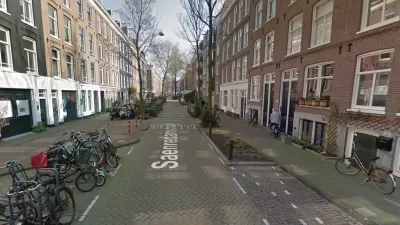Local governments are increasingly encouraging or even requiring LEED certification in new development, which is nice, but most continue to require generous minimum parking supply, which contradicts their goals.
Local governments are increasingly encouraging or even requiring LEED certification in new development, which is nice, but most continue to require generous minimum parking supply, which contradicts their goals. Average car-owning apartment dwellers generate more greenhouse gases by driving than by heating, cooling, lighting, and otherwise operating their home. Inefficient transportation policies not only increase energy consumption and pollution emissions, they also exacerbate other costs and problems: traffic congestion, traffic accidents, roadway costs, inadequate accessibility for non-drivers, and sprawl. Described differently, more efficient transportation and parking policies are far more important than LEED certification in acheiving true sustainability.
Here is one example sent to me by community activist Jon Petrie.
The City Of Vancouver, BC built a 98 unit market rental apartment tower above the new Community Center at Kingsway and Main designed to achieve Leed Gold certification. This building is located in a very walkable area with abundant local services, close to five major bus lines. It is an ideal location to encourage car-free living.

However, the building also has 78 underground parking stalls (0.8 spaces per unit). These parking spaces are unbundled (rented separately from housing units), but priced at just $35 per month, although the cost-recovery price would be about $250, so residents' parking, and therefore vehicle ownership are still subsidized by about $215 per month. If parking were efficiently priced, apartment rents could be reduced about $200 per month, greatly increasing housing affordability in a city with a severe housing unaffordability problem.
Conventional parking policies, such as generous minimum parking requirements in zoning codes and unpriced on-street parking, are intended to maximize parking supply and minimize user charges. They reflect the assumptions that parking is inexpensive to provide, that everybody drives everywhere, and that high rates of vehicle ownership and use create no significant problems to society. If any of these assumptions are questioned, current parking policies make no sense.
So why do cities continue with these inefficient practices? City officials fear the burden of increased enforcement of public (particularly on-street) parking spaces. Motorists want abundant, free parking at every destination and popular culture demonizes parking regulation enforcement, so city councilors and other public officials would rather foist the cost burden on developers than deal with the details of creating an efficient, fair and publically acceptable set of parking regulations and enforcement practices.
Vehicle ownership rates are actually declining in cities such as Vancouver, which are improving alternative modes (walking, cycling, public transit and carsharing) and creating more accessible, walkable communities, plus parking pricing and enforcement technologies are improving, so it makes sense to shift from our current, wasteful practices to more efficient parking management.
If we want to achieve true sustainability, LEED building certification is practically irrelevant if we fail to implement better parking policies and encourage more location-efficient development.
For information see:
CNU (2008), Parking Requirements and Affordable Housing, Congress for the New Urbanism (www.cnu.org); at www.cnu.org/node/2241.
Owen Jung (2009), Who Is Really Paying For Your Parking Space? Estimating The Marginal Implicit Value Of Off-Street Parking Spaces For Condominiums In Central Edmonton, Canada, Department Of Economics, University Of Alberta; at www.vtpi.org/jung_parking.pdf.
Todd Litman (2005), "Parking Costs," Transportation Cost and Benefit Analysis: Techniques, Estimates and Implications, Victoria Transport Policy Institute (www.vtpi.org); at www.vtpi.org/tca/tca0504.pdf.
Todd Litman (2006), Parking Management Best Practices, Planners Press (www.planning.org); www.vtpi.org/PMBP_Flyer.pdf.
Todd Litman (2006), Parking Management: Strategies, Evaluation and Planning, Victoria Transport Policy Institute (www.vtpi.org); at www.vtpi.org/park_man.pdf.
Todd Litman (2008), Recommendations for Improving LEED Transportation and Parking Credits, VTPI (www.vtpi.org); at www.vtpi.org/leed_rec.pdf.
Todd Litman (2010), Parking Pricing Implementation Guidelines: How More Efficient Pricing Can Help Solve Parking Problems, Increase Revenue, And Achieve Other Planning Objectives, Victoria Transport Policy Institute (www.vtpi.org); at www.vtpi.org/parkpricing.pdf.
Nelson/Nygaard (2009), Getting More with Less: Managing Residential Parking in Urban Developments with Carsharing and Unbundling, City CarShare (www.citycarshare.org), funded by the Federal Highway Administration; at www.citycarshare.org/download/CityCarShare2009BestPracticesReport.pdf.
Donald Shoup (2005), The High Cost of Free Parking, Planners Press (www.planning.org).
Rachel Weinberger, John Kaehny and Matthew Rufo (2009), U.S. Parking Policies: An Overview of Management Strategies, Institute for Transportation and Development Policy (www.itdp.org); at www.itdp.org/documents/ITDP_US_Parking_Report.pdf.

Florida Considers Legalizing ADUs
Current state law allows — but doesn’t require — cities to permit accessory dwelling units in single-family residential neighborhoods.

Manufactured Crisis: Losing the Nation’s Largest Source of Unsubsidized Affordable Housing
Manufactured housing communities have long been an affordable housing option for millions of people living in the U.S., but that affordability is disappearing rapidly. How did we get here?

Research Shows More Roads = More Driving
A national study shows, once again, that increasing road supply induces additional vehicle travel, particularly over the long run.

EV Chargers Now Outnumber Gas Pumps by Nearly 50% in California
Fast chargers still lag behind amidst rapid growth.

Affordable Housing Renovations Halt Mid-Air Amidst DOGE Clawbacks
HUD may rescind over a billion dollars earmarked for green building upgrades.

Has Anyone at USDOT Read Donald Shoup?
USDOT employees, who are required to go back to the office, will receive free parking at the agency’s D.C. offices — flying in the face of a growing research body that calls for pricing parking at its real value.
Urban Design for Planners 1: Software Tools
This six-course series explores essential urban design concepts using open source software and equips planners with the tools they need to participate fully in the urban design process.
Planning for Universal Design
Learn the tools for implementing Universal Design in planning regulations.
City of Moreno Valley
Institute for Housing and Urban Development Studies (IHS)
City of Grandview
Harvard GSD Executive Education
NYU Wagner Graduate School of Public Service
City of Cambridge, Maryland
Newport County Development Council: Connect Greater Newport






























